Johnwaruigaita
On this page, you find all documents, package deals, and flashcards offered by seller johnwaruigaita.
- 96
- 0
- 0
Community
- Followers
- Following
96 items
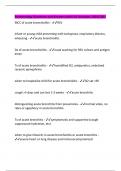
Pulmonology Questions and Answers with Full Solutions 2024/2025
MCC of acute bronchiolitis - RSV infant or young child presenting with tachypnea, respiratory distress, wheezing - acute bronchiolitis Dx of acute bronchiolitis - nasal washing for RSV culture and antigen assay Tx of acute bronchiolitis - humidified O2, antipyretics, nebulized racemic epinephrine when to hospitalize child for acute bronchiolitis - O2 sat <95 cough >5 days and can last 1-3 weeks - acute bronchitis distinguishing acute bronchitis from pneumonia - normal vitals, no rale...
- Exam (elaborations)
- • 13 pages •
MCC of acute bronchiolitis - RSV infant or young child presenting with tachypnea, respiratory distress, wheezing - acute bronchiolitis Dx of acute bronchiolitis - nasal washing for RSV culture and antigen assay Tx of acute bronchiolitis - humidified O2, antipyretics, nebulized racemic epinephrine when to hospitalize child for acute bronchiolitis - O2 sat <95 cough >5 days and can last 1-3 weeks - acute bronchitis distinguishing acute bronchitis from pneumonia - normal vitals, no rale...
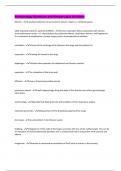
Pulmonology Questions and Answers plus Solutions 2024/2025
abscess - A localized collection of pus buried in tissues, organs, or confined spaces. adult respiratory distress syndrome (ARDS) - Chronic respiratory failure associated with various acute pulmonary injuries. It is characterized by pulmonary edema, respiratory distress, and hypoxemia. It is sometimes a complication of major surgery and is accompanied by infection. ventilation - Process of the exchange of air between the lungs and the ambient air. inspiration - Drawing air inward to the lungs...
- Exam (elaborations)
- • 8 pages •
abscess - A localized collection of pus buried in tissues, organs, or confined spaces. adult respiratory distress syndrome (ARDS) - Chronic respiratory failure associated with various acute pulmonary injuries. It is characterized by pulmonary edema, respiratory distress, and hypoxemia. It is sometimes a complication of major surgery and is accompanied by infection. ventilation - Process of the exchange of air between the lungs and the ambient air. inspiration - Drawing air inward to the lungs...
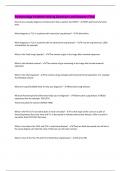
Pulmonology Problem-Solving Questions and Answers Final
How do you actually diagnose and document that a patient has COPD? - With pulmonary function tests. What happens to TLC in a patient with restrictive lung disease? - It diminishes. What happens to TLC in a patient with an obstructive lung disease? - It may be supranormal, 120% of predicted, for example What is the Total Lung Capacity? - The volume of gas in the lungs after maximal expansion. What is the Residual volume? - The volume of gas remaining in the lungs after forced maximal expirati...
- Exam (elaborations)
- • 21 pages •
How do you actually diagnose and document that a patient has COPD? - With pulmonary function tests. What happens to TLC in a patient with restrictive lung disease? - It diminishes. What happens to TLC in a patient with an obstructive lung disease? - It may be supranormal, 120% of predicted, for example What is the Total Lung Capacity? - The volume of gas in the lungs after maximal expansion. What is the Residual volume? - The volume of gas remaining in the lungs after forced maximal expirati...
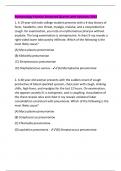
Pulmonology Practice Answered Queries with Solutions 2024
1. A 19-year-old male college student presents with a 4-day history of fever, headache, sore throat, myalgia, malaise, and a nonproductive cough. On examination, you note an erythematous pharynx without exudate. The lung examination is unimpressive. A chest X-ray reveals a right-sided lower lobe patchy infiltrate. Which of the following is the most likely cause? (A) Myco plasma pneumoniae (B) Klebsiella pneumoniae (C) Streptococcus pneumoniae (D) Staphylococcus aureus - (A) Mycoplasma pneumo...
- Exam (elaborations)
- • 28 pages •
1. A 19-year-old male college student presents with a 4-day history of fever, headache, sore throat, myalgia, malaise, and a nonproductive cough. On examination, you note an erythematous pharynx without exudate. The lung examination is unimpressive. A chest X-ray reveals a right-sided lower lobe patchy infiltrate. Which of the following is the most likely cause? (A) Myco plasma pneumoniae (B) Klebsiella pneumoniae (C) Streptococcus pneumoniae (D) Staphylococcus aureus - (A) Mycoplasma pneumo...
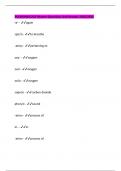
PULMONOLOGY Master Questions And Answer 2024/2025
re- - again spir/o - to breathe -atory - pertaining to oxy- - oxygen ox/i - oxygen ox/o - oxygen capn/o - carbon dioxide phon/o - sound -ation - process of in- - in -ation - process of
- Exam (elaborations)
- • 11 pages •
re- - again spir/o - to breathe -atory - pertaining to oxy- - oxygen ox/i - oxygen ox/o - oxygen capn/o - carbon dioxide phon/o - sound -ation - process of in- - in -ation - process of
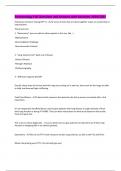
Pulmonology Full Questions and Answers with Solutions 2024/2025
Pulmonary Function Testing (PFT's) - A series of tests that are done together to get an overall idea of lung function. These tests are: 1. *Spirometry* (you can add on other aspects to this too, like...) -Methacholine -Bronchodilator Challenge -Neuromuscular Protocol 2. *Lung Volume Test* (pick one of these) -Helium Dilution -Nitrogen Washout -Plethysmography 3. *Diffusion Capacity (DLCO)* Overall, these tests tell us how well the lungs are moving air in and out, how much air the lun...
- Exam (elaborations)
- • 68 pages •
Pulmonary Function Testing (PFT's) - A series of tests that are done together to get an overall idea of lung function. These tests are: 1. *Spirometry* (you can add on other aspects to this too, like...) -Methacholine -Bronchodilator Challenge -Neuromuscular Protocol 2. *Lung Volume Test* (pick one of these) -Helium Dilution -Nitrogen Washout -Plethysmography 3. *Diffusion Capacity (DLCO)* Overall, these tests tell us how well the lungs are moving air in and out, how much air the lun...
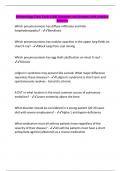
Pulmonology Flash Cards (148) Questions and Answers with Detailed Answers
Which pneumoconiosis has diffuse infiltrates and hilar lymphadenopathy? - Berylliosis Which pneumoconiosis has nodular opacities in the upper lung fields on chest X-ray? - Black lung from coal mining Which pneumoconiosis has egg shell calcification on chest X-ray? - Silicosis Lofgren's syndrome may present like sarcoid. What major difference separates these diseases? - Lofgren's syndrome is short term and spontaneously resolves - Sarcoid is chronic A DVT in what location is the most common...
- Exam (elaborations)
- • 18 pages •
Which pneumoconiosis has diffuse infiltrates and hilar lymphadenopathy? - Berylliosis Which pneumoconiosis has nodular opacities in the upper lung fields on chest X-ray? - Black lung from coal mining Which pneumoconiosis has egg shell calcification on chest X-ray? - Silicosis Lofgren's syndrome may present like sarcoid. What major difference separates these diseases? - Lofgren's syndrome is short term and spontaneously resolves - Sarcoid is chronic A DVT in what location is the most common...
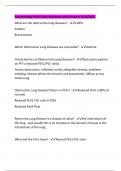
Pulmonology Final Exam Questions and Answers 2024/2025
What are the obstructive lung diseases? - COPD Asthma Brochiectasis Which Obstructive Lung Diseases are reversible? - Asthma Characteristics of Obstructive Lung Diseases? - Obstructive pattern on PFTs (reduced FEV1/FVC ratio) Airway obstruction, inflamed, easily collapsible airways, problems exhaling, disease affects the bronchi and bronchioles, diffuse across whole lung Obstructive Lung Disease Pattern in PFTs? - Reduced FEV1 (<80% of normal) Reduced FEV1:FVC ratio (<70%) Reduced ...
- Exam (elaborations)
- • 35 pages •
What are the obstructive lung diseases? - COPD Asthma Brochiectasis Which Obstructive Lung Diseases are reversible? - Asthma Characteristics of Obstructive Lung Diseases? - Obstructive pattern on PFTs (reduced FEV1/FVC ratio) Airway obstruction, inflamed, easily collapsible airways, problems exhaling, disease affects the bronchi and bronchioles, diffuse across whole lung Obstructive Lung Disease Pattern in PFTs? - Reduced FEV1 (<80% of normal) Reduced FEV1:FVC ratio (<70%) Reduced ...
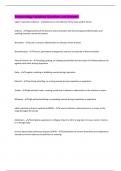
Pulmonology Explained Questions and Answers 2024/2025
upper respiratory infection - bacterial or viral infection of the nose and/or throat Asthma - hyperactivity of the bronchi and bronchioles with bronchospasm/inflammation and swelling severely narrow the lumens Bronchitis - acute or chronic inflammation or infection of the bronchi Bronchiectasis - Chronic, permanent enlargement and loss of elasticity of the bronchioles Pleural friction rub - creaking, grating, or rubbing sound when the two layers of inflamed pleura rub against each other duri...
- Exam (elaborations)
- • 6 pages •
upper respiratory infection - bacterial or viral infection of the nose and/or throat Asthma - hyperactivity of the bronchi and bronchioles with bronchospasm/inflammation and swelling severely narrow the lumens Bronchitis - acute or chronic inflammation or infection of the bronchi Bronchiectasis - Chronic, permanent enlargement and loss of elasticity of the bronchioles Pleural friction rub - creaking, grating, or rubbing sound when the two layers of inflamed pleura rub against each other duri...
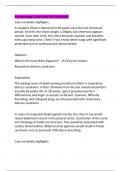
Pulmonology EXAM MASTER 2024/2025
Case Ico-delete Highlights A newborn infant is delivered at 30 weeks since the last menstrual period. At birth, the infant weighs 1,500gm, but otherwise appears normal. Soon after birth, the infant becomes cyanotic and breathes with a grunting noise. Chest X-rays reveal dense lungs with significant atelectasis but no cardiovascular abnormalities. Question What is the most likely diagnosis? - Correct answer: Respiratory distress syndrome Explanation The leading cause of death among prematur...
- Exam (elaborations)
- • 190 pages •
Case Ico-delete Highlights A newborn infant is delivered at 30 weeks since the last menstrual period. At birth, the infant weighs 1,500gm, but otherwise appears normal. Soon after birth, the infant becomes cyanotic and breathes with a grunting noise. Chest X-rays reveal dense lungs with significant atelectasis but no cardiovascular abnormalities. Question What is the most likely diagnosis? - Correct answer: Respiratory distress syndrome Explanation The leading cause of death among prematur...
